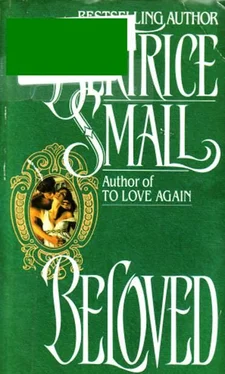Marcus Alexander had the most incredible urge to lift Zenobia from her horse and kiss that scornful mouth until it softened, but he did not. He could not jeopardize his position in Palmyra, and making love to the prince's bride-to-be would certainly do that. Instead he nodded, and said, "You are probably correct, Zenobia bat Zabaai. I would do well to return to the city immediately." And then, because he could not resist it, he said, "For all I know you are one of those women used to lure the unsuspecting traveler to his doom." It gave him great satisfaction to hear the furious gasp of outrage behind him as he rode off.
A beautiful girl, he thought; a bitter girl-but who could blame her? Antonius Porcius had simply said that Zenobia's mother had been killed by Roman legionnaires. He had said nothing of rape. Poor girl. This was certainly not the time to explain the differences to her between renegade Gauls and Romanized Britons like himself.
He rode a short distance, then turned his head to look back. She had whipped her horse into a gallop, and was tearing across the desert at an incredible speed. Marcus Alexander chuckled to himself. He liked a woman with real spirit.
He worked hard during the next few days, driven by the ex-slave who was to be his right-hand man. Severus had been his tutor as a boy, but when his father offered to free the man, Severus had asked to remain in the service of the Alexander family. It was a request they could not deny, and from that day on, Severus had learned from Lucius Alexander the ways of business. He had arrived in Palmyra two months before Marcus Alexander to purchase a villa and warehouse.
Now Marcus Alexander had to take the reins. Though he strove to concentrate, his mind was constantly being interrupted by visions of a long-legged girl as spirited as the white mare she rode. It came as something of a shock to him to realize that he wanted her, because he could not have her. Marcus Alexander, son of Lucius, wealthy, handsome, and since birth denied nothing within reason, had fallen in love seriously for the first time in his twenty-five years.
***
As the appointed day for the wedding grew closer, the excitement within the house of Zabaai ben Selim rose to a fever pitch. Though none of Zabaai's women except Tamar had ever paid the slightest attention to Zenobia, all now wanted to help, wanted to take the place of the bride's mother. Each advised her as many times daily as they could get near her; each attempted to choose her manner of dress; and each bitterly resented the interference of the others. Zenobia became as a choice piece of meat to be haggled over by the women in the market. She was finally forced to beg her father to tell his women that she wanted only Tamar to help her. Tamar, who was her friend, would be the bride's mother, and no other. Zenobia was finally left in peace.
On the evening before the marriage Zenobia took the small locket that her mother had given her when she was born, and laid it on the altar of the household gods. These gods had watched over her childhood, but tomorrow that childhood would be gone, never to return, and so she laid upon the altar in solemn sacrifice the last vestige of her early years. Had she been younger she would also have brought her toys, but those had long since been discarded. As she stood quietly in the little family garden that enclosed the altar she prayed for her mother, and wished that by some miracle known only to the gods themselves that Iris would be by her side tomorrow.
Tamar and Bab were both so good to her that she almost felt guilty, but for the first time in many months she missed her mother terribly. It was not so much Iris's golden beauty she recalled, but rather the sweet smell of her perfume; the gentle touch of her hand; the swish of her long skirts when she left Zenobia's room at night. She remembered the beautiful woman who always had time to explain, who hugged easily and without the least hint of embarrassment, who laughed happily to see her daughter and her husband together playing. A tear slipped down Zenobia's cheek, and then another, until her face was wet with sorrow.
Across the garden Bab saw the girl's shoulders shaking with her grief, and made to go to her; but Tamar held her back. "No," said Zabaai ben Selim's surviving wife. "She has never really cried since Iris's death, and she needs to weep. Let her leave her sorrow behind with the rest of her childhood things."
Bab nodded. "You are right, of course, but how I hate to see her hurt. If I could I would shield her from all the evil in life."
"You would do her no favor then, Bab. Zenobia must face everything that comes her way by herself. If she does not know evil when she encounters it, how will she deal with it?"
"I know, I know. Besides, I babble foolishness. Who has ever been able to shield Zenobia from anything?" Bab replied.
"Let us go inside," Tamar replied. "Soon our child will come to try on her wedding garment for luck. She must not know that we have observed her in a private moment."
The two women returned to their quarters and awaited the girl whom they both loved, so they might share this traditional time with her that her own mother could not. Both believed, however, that Iris watched from the paradise within the underworld to which the just are confined.
Sleep was elusive for Zenobia that night. Like any young bride-to-be, she was both fearful and excited about the morrow's events. The tantalizing moments that she had had with the prince those two weeks back had only increased her curiosity. When she finally dozed it was only to awaken with a start, remembering a confused jumble of a dream in which a Roman had gazed upon her with mocking blue eyes. Zenobia sat up trembling, wondering if the shade of her mother's murderer had come to haunt her on this the night before her marriage. Then she remembered the Roman, Marcus Alexander Britainus, whom she had met in the desert a few days earlier. He had been the man in her dream. Puzzled, she wondered why she had dreamed of him. With a confused little shake of her head she lay back down to rest, and fell into a light sleep.
In the hour before dawn the public augur arrived, and a young ewe was sacrificed. The omens were considered most favorable. The house of Zabaai ben Selim was decorated with a multitude of flowers; the boughs of palm trees; colorful bands of wool that had been entwined about the pillars; and exquisite tapestries hung all about the atrium, where the ceremony would take place. Before first light, the guests began arriving.
In her bedchamber, aided by Tamar and Bab, Zenobia completed the final preparations. She had already bathed and washed her lovely black hair, which was now divided into six locks with a spear-shaped comb. This was an ancient custom dating from the time when marriage by capture was the rule rather than the exception. These locks were carefully coiled, and held in place with ribbons of silver lamé.
The wedding gown was a white tunic of gossamer silk, woven by Tamar and Bab. The straight garment was made from a single piece of cloth, and fell to Zenobia's feet which were shod in silver sandals. The tunic was fastened around the waist with a band of wool tied in the knot of Hercules, for Hercules was the guardian of wedded life. When he became Zenobia's husband only Odenathus would be privileged to untie this knot. Over her tunic the bride wore a flame-colored veil; atop her head was a wreath of sweet, white freesia.
Downstairs, the groom had arrived with his mother and friends. He wore a silver-bordered white toga, and was given a wreath of white freesia, matching his bride's, for his head. The augur formally pronounced the omens as favorable, the wedding was ready to begin.
Zenobia was brought forward by Tamar, who had been chosen as pronuba for the ceremony. Zabaai's wife then joined the bride and groom's hands before the guests, and Zenobia spoke the words of her consent to this marriage. She spoke them three times, once in Latin, once in Greek, and once in the Aramaic dialect of her tribe, so that everyone in the room might understand:
Читать дальше












